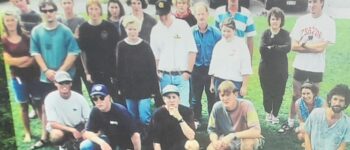1995: Cave Creek Collapse
April 28, 2023
By AHNZ
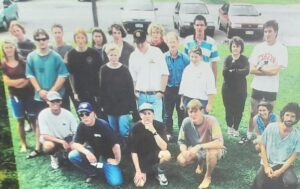 Today in history, 28 April 1995, 14 young people fell to their deaths when a Government viewing platform collapsed under their feet on the West Coast.
Today in history, 28 April 1995, 14 young people fell to their deaths when a Government viewing platform collapsed under their feet on the West Coast.
The National 4.0 Government launched an inquiry at once but as this Tremain cartoon (below) of the day shows the brief excluded an examination of their own fiscal policy.
In a recent interview, National 4.0 Prime Minister, Jim Bolger, said he ought to have fired his Minister of Conservation, Denis Marshall. Not because Marshall was to blame, but as a symbol to the people¹. Revenge, the taking of scalps, is good politics in New Zealand. We imagine we’ve fixed something if the Old Boss is sacrificed and a New Boss sworn in.
Government never lets a crisis go to waste. It brought in outside consultants, good friends of the National Party no doubt, who must have been paid a fortune to audit the bridges and platforms of New Zealand. Money flowed out of the taxbase and into the hand of selected allies; Always the government’s goal. Any little bridge might kill a kid and had to be cataloged! Australian Rio Tinto consultants (aka Comalco) were recycling a panic into a pay day. It was as if their fee was related to how many potential risks they could document. Cave Creek kids had probably collected and recycled crushed aluminum cans in the early to mid-1990s for Comalco for money and now they had become the can. Their families were paid $2,600,000 in compensation even though no legal ruling found the Government at fault for what happened at all. That didn’t matter. The new Ministers of Conservaiton, Simon Upton and Nick Smith, had the cover they needed to do whatever felt right.
I remember this. For years afterwards every little platform or bridge, no matter how sound, was taped off with warning signs all over New Zealand. Anything could kill you! An Australian was coming to audit it to find out. There was a simple log over a not 5 foot wide creek in the Oxford Forrest so you could cross without getting your feet wet and even this was prohibited with warning tape! New Zealand had gone into a panic and now paid the Aussies to propitiate the Safety Gods. That is why, to this day, even the most simplistic little bridges on walking tracks have a warning sign about how many people they can hold.
“But out of it, we realised we had to restore the faith of the public in the agency, and that was probably some of the most satisfying work we did. We worked on a whole new system of accountability, of visitor safety, and quality assurance standards.”
“Bolger brought in an advisor who subsequently got Australian Rio Tinto consultants to do assessments, Sanson said.” – Covid-19 rules postpones Cave Creek remembrance, RNZ (2020)
“A survivor of the Cave Creek tragedy says he and several other students were shaking the Department of Conservation viewing platform hard when it collapsed…The 18-year-old was one of several students shaking the platform, “just fooling round”. “It was shaking a lot. We were giving it a good nudge. But we felt safe doing it. “There was a sudden movement forward and the platform just dropped. It tilted in a violent movement and we all fell forward against the handrail…fear of being blamed kept him from talking to the police or to the commission of inquiry into the cause of the tragedy.” – Cave Creek haunts survivor, NZ Herald (2005)
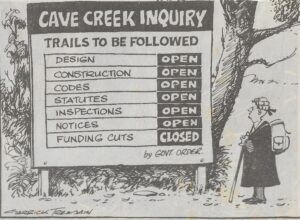 Blame fell on the Department of Conservation, the new Government department that had 8 years before taken over from the Forest Service. The infrastructure and attitude of the bush had hitherto been that it was a dangerous wilderness where those venturing into it had to have respect and be prepared. Here in the wild you looked out for yourself, Barry Crump style. If you wanted to be dependent and close to where ‘civilisation’ and your mother could rescue you then you could stay in the cities.
Blame fell on the Department of Conservation, the new Government department that had 8 years before taken over from the Forest Service. The infrastructure and attitude of the bush had hitherto been that it was a dangerous wilderness where those venturing into it had to have respect and be prepared. Here in the wild you looked out for yourself, Barry Crump style. If you wanted to be dependent and close to where ‘civilisation’ and your mother could rescue you then you could stay in the cities.
That ethic changed now as the locus of risk-taking and safety shifted after 1995 from the individual to the group. Adventure Playgrounds in schools everywhere were captured by Safetyism and so cut down and replaced by habitat enrichment apparatus where kids could not be hurt. Ref. 1986: Adventure Playground, AHNZ
The coddling of the New Zealand kid’s mind and body extended to cycling. Everyone now forced to wear a helmet. Ref. 1994: The Stackhat Deception, AHNZ
We were now living in the historical era AHNZ identifies as Stackhat Slave Culture. The Cave Creek youths were studying euphemistically re-imagined polytech courses in “outdoor recreation” and “leadership management.” The attitude to the New Zealand bush of the Pioneers certainly wasn’t like that and I don’t think the Forest Service called what it did “recreation” either. These late-Generation X kids had been raised under the impression that they did not need to look out for themselves and manage their own risks. Society would do that. Society would make sure every environment was safe, from your school fort to platforms in the wilderness. Society would provide helmets and force you to put them on. Society replaced the concrete beneath playground jungle gyms with soft bark chips to catch your or, more recently, bouncy rubber matting. You wont get hurt climing trees like your ancestors because we just wont let you!
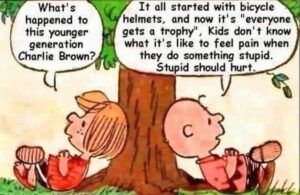 But this is just setting kids up to win a Darwin Award.
But this is just setting kids up to win a Darwin Award.
It’s called Offsetting Behavior. When the locus of responsibility and risk is shifted from the individual they take their safety for granted and so take bigger risks. We don’t watch out for ourselves because we have learned to expect Big Brother to catch us. At the extreme, we push the limits by taking for granted the structures that protect us and abuse them. We shake them, probe them, try to destroy them. We poke bears. We tempt fate. We spit at Darwinian Selection. The Cave Creek Generaton X kids learned at school that Darwin wont push back. That being stupid doesn’t hurt. They learned it on a small scale in the learning environment and then took that attitude out over a 30 metre drop to certain death in a remote chasm and bet their lives on it.
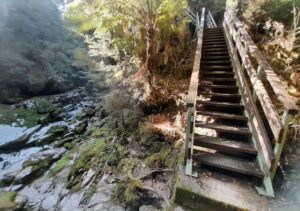 Back then, as after, it’s Politically Incorrect to hold these leadership trainees responsible for what happened to them. The cultural imperative to keep the locus of risk-taking on the collective rather than the individual was more important and we doubled down. Every stick and bolt in the ‘outdoor environment’ was subjected to even more Safetyism. We hadn’t seen anything like this outbreak of Slave Culture since Muldoonist Slave Culture 20 years before and we wouldn’t see anything like this again until COVID Slave Culture 20 years later.
Back then, as after, it’s Politically Incorrect to hold these leadership trainees responsible for what happened to them. The cultural imperative to keep the locus of risk-taking on the collective rather than the individual was more important and we doubled down. Every stick and bolt in the ‘outdoor environment’ was subjected to even more Safetyism. We hadn’t seen anything like this outbreak of Slave Culture since Muldoonist Slave Culture 20 years before and we wouldn’t see anything like this again until COVID Slave Culture 20 years later.
If New Zealand really wanted the truth, if the inquiry had really wanted to know what happened at Cave Creek, they could have interviewed those who were there. Stacy Mitchell, who survived, admits several students manually destroyed the platform that fell and killed them. Sounds a lot like Offsetting Behavior doesn’t it? Mainstream history wont touch that information though, preferring to double-down of the ethic of collectivism rather than personal responsibility.
Mitchell turned to substance abuse to endure the Dark Secret. His view was that he and others had sealed their own fate. This was easy to keep from the police and the commission of inquiry. Why? Not because they lack the ability to interview a teenager. They could have found out if they’d wanted to understand. If they’d wanted to do their jobs and discover the reality it would be no problem. Police, investigators, even the media themselves, crack open more difficult interview subject than this as a matter of course. So why didn’t they let Mitchell tell them or even insist that he tell them this? Because they knew: Never ask questions you don’t want to know the answers to.
—
1 Ref. 1hr in to audio recording, RNZ (2017)
Image ref. Press (May, 1995,) AHNZ Archives
Image ref. Cave Creek expedition a one-way trip for most in this picture, display panel at Cave Creek. AHNZ Archives (2022)
Image ref. Cave Creek floor, AHNZ Archives (2022)
Ref. also How NZ gets into ‘Tall Poppy Syndrome’ via trauma
Update 2025: “It seems extremely naive and churlish that your historic lens will focus on the minutiae of young adults shaking a platform in a country were building and safety standards had existed for at least four generations before myself and my friends stepped on that platform and shook it.”
 Like Comment Share
Like Comment Share

